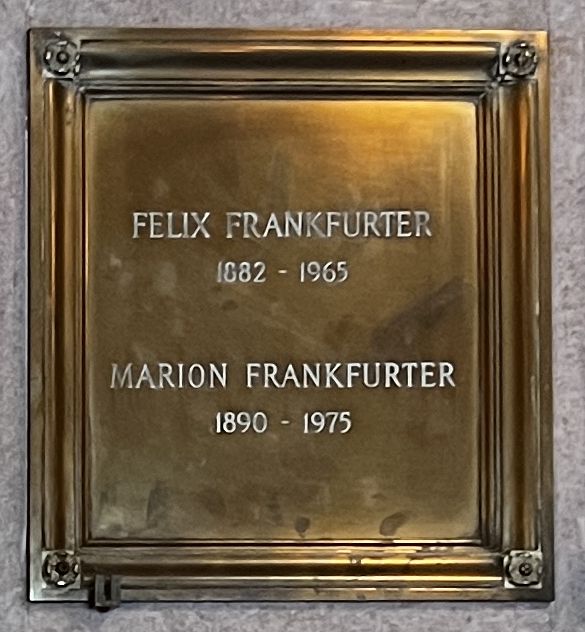
Felix Frankfurter (1882-1965)
U.S. Supreme Court Associate Justice & Political Advisor
Born in Vienna, Austria on November 15, 1882, Felix Frankfurter was an Associate Justice of the U.S. Supreme Court. Felix was the son of Leopold Frankfurter, a rabbinical student turned businessman, and Emma Winter Frankfurter. In 1894 the family moved to the United States where Leopold worked as a linen merchant. In 1902 Frankfurter received his B. A. from the College of the City of New York. After working for a year in the tenement house department of New York City, he entered Harvard Law School. There he developed a circle of friends that included his roommate Morris Cohen, the future philosopher; Emory Buckner, later a U.S. attorney in New York; and Grenville Clark, a future leader of the New York bar and a pioneer in the world government movement. After graduation in 1906, Frankfurter joined a New York City law firm but soon moved to the office of the U. S. Attorney, where he met his first long-term mentor, Henry L. Stimson. When Stimson ran for Governor of New York in 1910 Frankfurter campaigned for him. Although Stimson lost that election, he was named Secretary of War by President Taft. Stimson then appointed Frankfurter a legal officer of the Bureau of Insular Affairs.
During this period of his career, Frankfurter became close friends with Associate Justice of the U.S. Supreme Court Oliver Wendell Holmes, Jr., and Louis D. Brandeis, later appointed a Justice of the Supreme Court. Harvard Professor John Chipman Gray (Lot 1087 Hemlock Path) was instrumental in introducing Frankfurter to Holmes. Gray had selected law clerks for Justice Holmes for many years and when Gray died in 1915 Frankfurter took on that role. Frankfurter also recruited law clerks for Justice Brandeis and worked with him on many Zionist causes.
In 1914 Frankfurter was appointed the Professor of Administrative Law at Harvard, where he taught until 1939. He wrote new casebooks in the areas such as administrative law and public utilities. He co-authored The Business of the Supreme Court (1928) with James M. Landis and The Labor Injunction (1930) with Nathan Greene. In 1917 Frankfurter left his teaching position to serve in the U.S. Army as a major in the Judge Advocate’s Department and was apprenticed Secretary and Counsel to the President’s Mediation Commission which handled labor stoppages in war industries. In 1918 Frankfurter became chairman of the International War Labor Policy Board, where he met Franklin Delano Roosevelt, then Assistant Secretary of the Navy. Frankfurter was an original member of the American Civil Liberties Union (ACLU). He was appointed by Federal Judge George W. Anderson of Boston to assist in the defense of unnaturalized foreign residents arrested and held for deportation- most of them were eventually released.
In 1921 Sacco and Vanzetti, two politically active Italian immigrants, were convicted of two murders committed during a payroll robbery in Braintree, Massachusetts on April 15, 1920. There was widespread concern that the guilty verdict represented a judgment based more on their anarchist political activities than their guilt. A lengthy legal battle to save the two men lasted until they were executed in August 1927. Frankfurter was actively involved in their defense. He wrote an article in the Atlantic Monthly in March 1927 examining the legal case that he later expanded into the book The Case of Sacco and Vanzetti (1927). He analyzed the evidence and strongly criticized the conduct of the trial judge, Webster Thayer, and the prosecution and urged a new trial. Massachusetts Governor Alvin Fuller appointed a commission headed by Harvard President Abbott Lawrence Lowell (Lot 3401 Bellwort Path) to review the case. The commission supported the proceedings of the original trial and the two defendants were executed in August 1927. Frankfurter’s wife Marion, whom he married in 1919, edited with Gardner Jackson The Letters of Sacco & Vanzetti (1928). Fifty years later Massachusetts Governor Dukakis issued an Executive Proclamation acknowledging that the prosecution of Sacco and Vanzetti was flawed, reflecting prejudice against foreigners and those with radical political beliefs, and declared Nicola Sacco and Bartolomeo Vanzetti blameless.
During the 1920s Frankfurter and Roosevelt continued to kept in touch with one another. After being elected President, Roosevelt frequently called upon Frankfurter for legal advice as the legislative acts of the New Deal were put in place. On January 5, 1939 Roosevelt nominated Frankfurter to the U.S. Supreme Court. While serving on the Supreme Court, Frankfurter became a noted champion of individual civil rights and his opinions were sometimes seen as extremely liberal. He worked closely with Chief Justice Earl Warren to secure a unanimous decision outlawing racial segregation in public schools in the landmark case Brown vs. Board of Education (1954). In April 1962, Frankfurter suffered a stroke and retired from the Court on August 28, 1962. In 1963 he was awarded the Presidential Medal of Freedom.

Felix Frankfurter is inurned at Mount Auburn in the Story Chapel Columbarium.
Footnotes:
Adapted from the research of Judy Jackson and Laura M. Gosman, as published in Mount Auburn’s Person of the Week: Felix Frankfurter, 2002.
